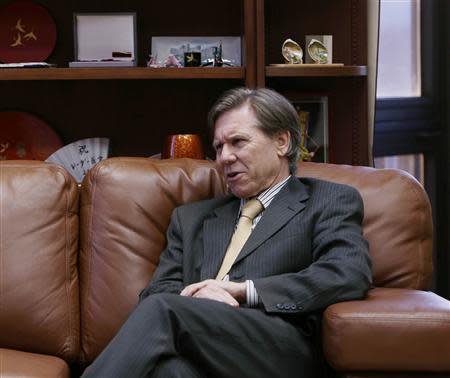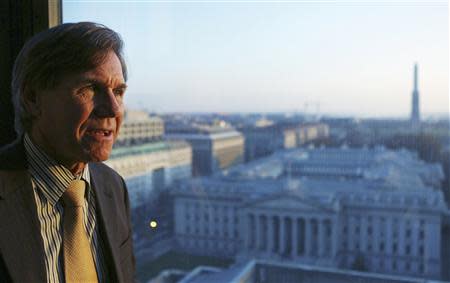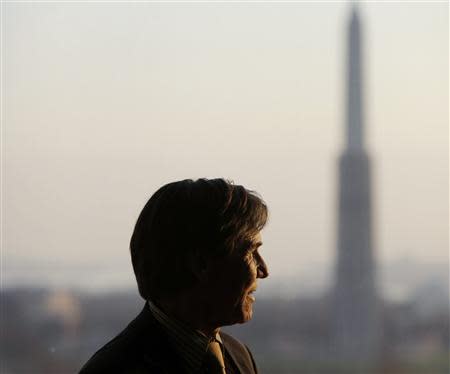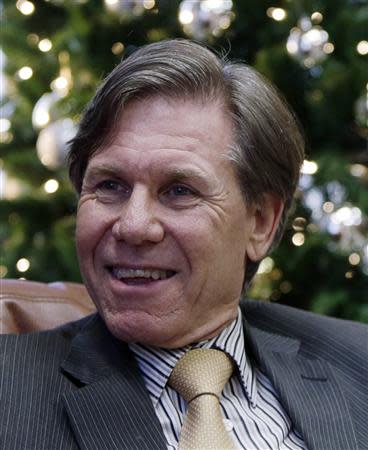Insight: Rocker judge juggles tech policy, Supreme Court and the Stones
By Dan Levine WASHINGTON (Reuters) - In the cloistered federal appeals courts, where cameras are taboo and life-tenured judges toil in seclusion, Randall Rader relishes his persona as a hard-charging front man. While working a full case load as chief judge of the U.S. Court of Appeals for the Federal Circuit in Washington, Rader gives up to 100 speeches a year - frequently abroad - extolling the American patent system that his court oversees. He's a practicing Mormon who has never intentionally consumed alcohol (he says he once drank from a spiked punch bowl by mistake), but Rader also sings vocals in a rock band. Van Morrison and Rolling Stones covers are favorites at legal conference gigs. "Rock music is energy," said Rader, who likes to stroll the stage, mic in hand. "We want to project that energy." Rader's frenetic personality makes him an able ambassador for the Federal Circuit, created in 1982 to handle patent appeals from around the country in order to bring uniformity to a highly technical area of law. Rader sees the court as a protector of U.S. innovation - it is at the center of a roiling debate over tech policy with billions of dollars at stake, hearing cases such as the smartphone wars between Apple Inc and Samsung Electronics Co. But the competitive judge has had a harder time at bringing his colleagues together on some high profile legal issues, which is another key aspect of the job. That lack of consensus in chambers is stoking a broader debate about the court's role. In the midst of a new tech boom, a recent University of Iowa study found the rate at which Federal Circuit judges unanimously agreed in its patent cases went from about 80 percent in 2005 down to 60 percent last year. On Friday the Supreme Court agreed to review a closely watched case on software patents which the Federal Circuit had been unable to resolve. Where historically the Supreme Court had been content to let the Federal Circuit have the final say on patents, now it frequently marches onto the Federal Circuit's turf. At a Federalist Society panel earlier this year, Seventh Circuit Judge Richard Posner said Rader's court "has trouble getting its act together." Posner's colleague, Seventh Circuit Chief Judge Diane Wood, recently suggested that the law would be sharper if Congress ended the Federal Circuit's monopoly on patent cases, allowing multiple appeals courts to hammer away at key issues. Yet corporate attorneys do not relish the bad old days when the fate of a patent case hinged on which part of the country it was litigated, due to widely divergent views. "It was awful," said Paul Berghoff, a Chicago intellectual property litigator, who added that the Federal Circuit tries hard for consensus. "It's not perfect on that score but it's pretty good," Berghoff said. Rader said he and his colleagues "succeed more often than not" on coming together. He called the Supreme Court "one of the most magnificent institutions created by man," but said its culture of weighing vast societal conflicts clashed with the need to provide clear commercial guidance in patent cases. That clash has contributed to turbulence in the law, he added. Rader said he hopes the Supreme Court recognizes that his colleagues' patent expertise has not been acquired lightly. "I have spent 30 years studying every aspect of patent law in every legal system in the world. I can compare and contrast them with ease and facility," Rader said. "I guess I would ask them to trust my culture as much as I trust theirs." Rader said the Federal Circuit has proven that it can come together and settle the thorniest legal issues. It just needs time. HARD ON HIS OWN PARTNERS With thick brown hair and a trim build, Rader is an avid tennis player who can be just as hard on his own doubles partners as with his opponents, according to Dee Benson, a Utah federal judge and close friend. "My dad was a coach and I'm still trying to beat my dad," Rader said with a laugh. "When I don't succeed I try harder. You get the picture?" Rader grew up in Oregon and worked for Republican Senator Orrin Hatch before being appointed to the U.S. Court of Federal Claims in 1998. An English literature major, he said he wasn't afraid of science and dove into patent cases as a trial judge. President George H.W. Bush nominated him for the Federal Circuit in 1990, and he became chief three years ago. His term lasts until 2017. During his time on the bench, patents went from a backwater to one of the most lucrative legal specialties, and the U.S. Patent and Trademark Office issued tens of thousands of software patents. Many advocates of patent reform, including Google Inc, say those patents are too vague and are snapped up by so-called trolls, who sue companies and drain resources away from innovation. They are pushing Congress to issue stricter rules on what software can be patented. It's a highly contentious area where, if Rader's court spoke with a unified voice, it might save Congress the work and bring clarity to how tech companies should invest their vast resources. Instead, Rader suffered what he calls the biggest failure of his career in the case now under the Supreme Court's microscope, which involves software patents. In CLS Bank vs. Alice Corp, CLS claimed that a series of software patents held by Alice were too abstract and should never have been issued. Earlier this year the Federal Circuit agreed to hear the case before all ten full time judges (new judges have since joined the court). Tech lawyers and reform advocates eagerly anticipated fresh guidance. But instead of a precedential opinion, the Federal Circuit cracked. Five judges wrote that none of Alice's patents should have been issued. The other judges, including Rader, believed that some or all of them were valid. There were six opinions in all, and none commanded a majority. "I do not, nor would I presume, to have any ability to alter my colleagues' well considered and deep views, so sometimes you just have to respect that there will be differences that can't be resolved," Rader told Reuters. "But I tried hard and I felt that I had failed." One judge familiar with the court said Rader has a tendency to advance his own point of view on cases when it could be subordinated in the interest of collegiality. But even 7th Circuit Chief Judge Wood said leading the Federal Circuit would be tough for anyone. "You are simply one among equals as the chief judge, and it behooves you not to forget that," Wood said. HELP WITH THE DETAILS The Supreme Court on Friday announced it would review the CLS case during its current term, and an opinion is likely by the end of June. Given Rader's competitiveness and depth of patent knowledge, his friend Benson said the Supreme Court's increased interest in the field is particularly challenging. "I think that that's probably where all the personality traits meet," Benson said. "I don't think that he's going to be easily convinced that the Supreme Court is right." While the Federal Circuit failed to speak coherently on software patents, Rader said it has come together on other extremely important issues in tech law. For instance, the court has recently limited the damages companies can recover for small patented features in complex devices like smartphones. Before those rulings, caps on damages had been included in patent reform proposals in Congress. But now that the Federal Circuit has issued guidance, the damages issue is virtually absent from Congress's to-do list. Rader said he thinks his biggest strength is drawing his colleagues into a broader vision for the court as a protector of innovation in the United States, but he acknowledged that he can also stumble at the finer points of achieving consensus. "Your greatest strength is also your greatest weakness," Rader said. "I get wrapped up in these visions and overlook sometimes the details necessary to get at them. I need a lot of help in the details." (Reporting by Dan Levine; Editing by Peter Henderson and Grant McCool)





